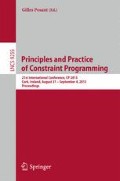Abstract
Linear constraints are the most common constraints occurring in combinatorial problems. For some problems which combine linear constraints with highly combinatorial constraints, the best solving method is translation to SAT. Translation of a single linear constraint to SAT is a well studied problem, particularly for cardinality and pseudo-Boolean constraints. In this paper we describe how we can improve encodings of linear constraints by taking into account implication chains in the problem. The resulting encodings are smaller and can propagate more strongly than separate encodings. We illustrate benchmarks where the encoding improves performance.
Access this chapter
Tax calculation will be finalised at checkout
Purchases are for personal use only
Preview
Unable to display preview. Download preview PDF.
References
Abio, I., Mayer-Eichberge, V., Stuckey, P.: Encoding linear constraints with implication chains to CNF. Tech. rep., University of Melbourne (2015). http://www.people.eng.unimelb.edu.au/pstuckey/papers/cp2015a.pdf
Abío, I.: Solving hard industrial combinatorial problems with SAT. Ph.D. thesis, Technical University of Catalonia (UPC) (2013)
Abío, I., Nieuwenhuis, R., Oliveras, A., Rodríguez-Carbonell, E.: A parametric approach for smaller and better encodings of cardinality constraints. In: Schulte, C. (ed.) CP 2013. LNCS, vol. 8124, pp. 80–96. Springer, Heidelberg (2013)
Abío, I., Nieuwenhuis, R., Oliveras, A., Rodríguez-Carbonell, E., Mayer-Eichberger, V.: A New Look at BDDs for Pseudo-Boolean Constraints. J. Artif. Intell. Res. (JAIR) 45, 443–480 (2012)
Abío, I., Stuckey, P.J.: Encoding linear constraints into SAT. In: O’Sullivan, B. (ed.) CP 2014. LNCS, vol. 8656, pp. 75–91. Springer, Heidelberg (2014)
Bailleux, O., Boufkhad, Y., Roussel, O.: New encodings of pseudo-boolean constraints into CNF. In: Kullmann, O. (ed.) SAT 2009. LNCS, vol. 5584, pp. 181–194. Springer, Heidelberg (2009)
Biere, A., Heule, M., van Maaren, H., Walsh, T. (eds.): Handbook of Satisfiability, Frontiers in Artificial Intelligence and Applications, vol. 185. IOS Press (2009)
Bofill, M., Nieuwenhuis, R., Oliveras, A., Rodríguez-Carbonell, E., Rubio, A.: The barcelogic SMT solver. In: Gupta, A., Malik, S. (eds.) CAV 2008. LNCS, vol. 5123, pp. 294–298. Springer, Heidelberg (2008)
Dutertre, B., de Moura, L.: The YICES SMT Solver. Tech. rep., Computer Science Laboratory, SRI International (2006). http://yices.csl.sri.com
Eén, N., Biere, A.: Effective preprocessing in SAT through variable and clause elimination. In: Bacchus, F., Walsh, T. (eds.) SAT 2005. LNCS, vol. 3569, pp. 61–75. Springer, Heidelberg (2005)
Eén, N., Sörensson, N.: Translating Pseudo-Boolean Constraints into SAT. Journal on Satisfiability, Boolean Modeling and Computation 2(1–4), 1–26 (2006)
Gent, I.P., Prosser, P., Smith, B.M.: A 0/1 encoding of the GACLex constraint for pairs of vectors. In: ECAI 2002 workshop W9: Modelling and Solving Problems with Constraints. University of Glasgow (2002)
Heule, M.J.H., Järvisalo, M., Biere, A.: Efficient CNF simplification based on binary implication graphs. In: Sakallah, K.A., Simon, L. (eds.) SAT 2011. LNCS, vol. 6695, pp. 201–215. Springer, Heidelberg (2011)
de Moura, L., Bjorner, N.: Z3: An Efficient SMT Solver. Tech. rep., Microsoft Research, Redmond (2007). http://research.microsoft.com/projects/z3
Ohrimenko, O., Stuckey, P., Codish, M.: Propagation via lazy clause generation. Constraints 14(3), 357–391 (2009)
Petit, T., Régin, J.-C., Beldiceanu, N.: A \(\Theta \)(n) bound-consistency algorithm for the increasing sum constraint. In: Lee, J. (ed.) CP 2011. LNCS, vol. 6876, pp. 721–728. Springer, Heidelberg (2011)
Srinivasan, A., Ham, T., Malik, S., Brayton, R.: Algorithms for discrete function manipulation. In: 1990 IEEE International Conference on Computer-Aided Design, ICCAD 1990, pp. 92–95. Digest of Technical Papers (1990)
Author information
Authors and Affiliations
Corresponding author
Editor information
Editors and Affiliations
Rights and permissions
Copyright information
© 2015 Springer International Publishing Switzerland
About this paper
Cite this paper
Abío, I., Mayer-Eichberger, V., Stuckey, P.J. (2015). Encoding Linear Constraints with Implication Chains to CNF. In: Pesant, G. (eds) Principles and Practice of Constraint Programming. CP 2015. Lecture Notes in Computer Science(), vol 9255. Springer, Cham. https://doi.org/10.1007/978-3-319-23219-5_1
Download citation
DOI: https://doi.org/10.1007/978-3-319-23219-5_1
Published:
Publisher Name: Springer, Cham
Print ISBN: 978-3-319-23218-8
Online ISBN: 978-3-319-23219-5
eBook Packages: Computer ScienceComputer Science (R0)

